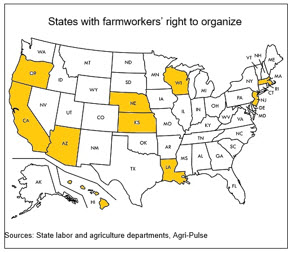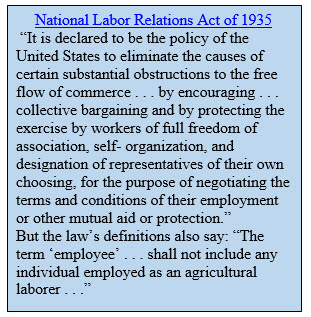WASHINGTON, Nov. 23, 2016 - Do America’s farmworkers have a right to organize and bargain collectively?
In some places, yes, but the answer is a moving target state to state. Ten states (see map) provide some level of assurance for farm laborers to organize. On the other hand, Idaho and Maine have repealed that protection in recent years, although Maine’s had applied only to large egg farms.
 Nationally, the right to organize was granted to most U.S.
citizens long ago in the National
Labor Relations Act of 1935 (see box below). Thus, many Americans assume
all workers have that slice of civil liberty. But, in defining categories of
folks covered by the NLRA, Congress carved out agricultural workers, domestic
workers, independent contractors and some others.
Nationally, the right to organize was granted to most U.S.
citizens long ago in the National
Labor Relations Act of 1935 (see box below). Thus, many Americans assume
all workers have that slice of civil liberty. But, in defining categories of
folks covered by the NLRA, Congress carved out agricultural workers, domestic
workers, independent contractors and some others.
Over the decades, meanwhile, most states have let the national exclusion of farmworkers stand, but a handful have recognized the freedom to organize in a range of ways. States such as Kansas, Nebraska and Wisconsin extend the right, but prohibit or apply caveats to strikes during harvest or work stoppages that would, for example, leave dairy barns full of cows not getting milked.
Nebraska’s law on organizing is typical of that group of states. Christin Kamm, spokesperson for the Nebraska Department of Agriculture, summarizes: “Farm workers in Nebraska are not excluded from the rights of employees to organize and collectively bargain. However, the statutes specifically state that certain employers, including farmers and farmer cooperatives, face special problems arising from perishable commodities and seasonal production which require adequate consideration. Additionally, no person has the right to engage in a secondary boycott (to among other things, cause injury by withholding labor without a labor dispute).”
Meanwhile, for more than 60 years Louisiana has extended collective bargaining rights to farmworkers employed in cotton ginning, sugar cane processing, and “those who sow, tend, reap, or harvest crops, livestock, or other agricultural products on farms and plantations.”
Farmers and ranchers, though many of them may work six or seven days a week themselves, come to this issue as the employers, and the American Farm Bureau Federation, with members coast to coast, wants to retain the NLRA omission of farm laborers.
Kristi Boswell, AFBF labor policy specialist, says, “We think Congress got it right, recognizing agriculture as unique, when they were considering this in the National Labor Relations Act.” Allowing farmworkers to form bargaining collectives would put farmers “over a barrel” and in danger “of not being able to get their crops off the field it there were a strike during a particular harvest,” she says. “These are perishable commodities; the cows have got to be milked today,” so organized labor among workers “is always disruptive,” she says.
Boswell acknowledges that AFBF “specifically supports states deciding (their own farm labor laws), looking at the realities in particular states.” But she says the limitations and caveats that some states attach “rightly recognize the reasons why there is no protective right to recognize (farmworkers) under federal law, and it is because of those unique circumstances” that make farms especially vulnerable to labor union action.
The merits of fencing farmworkers out of the right to organize, however, is facing a landmark challenge in New York, where a suit by farmworker groups and the New York Civil Liberties Union (NYCLU) asks a state Supreme Court judge to confirm a provision of the state constitution’s bill of rights, which declares broadly that “employees shall have the right to organize and to bargain collectively through representatives of their own choosing.”
Erin Harrist, NYCLU lawyer for the farmworkers, expects that a favorable State Supreme Court ruling would declare as unconstitutional a phrase in New York’s State Employment Relations Act (SERA) that leaves farm laborers without job protections, thus effectively giving farmworkers the same rights as other workers to organize.
 New York’s governor and attorney general have both agreed
with the farmworkers that the provision is unconstitutional and say they won’t
defend it in court. However, the New York Farm Bureau’s view mimics AFBF’s
position, and the court has allowed it to intervene and
defend the law’s exclusion of farmworkers. Says Steve Ammerman, NYFB public
affairs manager: “The current state law excluding farmworkers from collective
bargaining is valid and constitutional. Rules meant to govern manufacturing
simply don’t work on farms.”
New York’s governor and attorney general have both agreed
with the farmworkers that the provision is unconstitutional and say they won’t
defend it in court. However, the New York Farm Bureau’s view mimics AFBF’s
position, and the court has allowed it to intervene and
defend the law’s exclusion of farmworkers. Says Steve Ammerman, NYFB public
affairs manager: “The current state law excluding farmworkers from collective
bargaining is valid and constitutional. Rules meant to govern manufacturing
simply don’t work on farms.”
On the other hand, Crispin Hernandez, a dairy-farm worker who says he was fired for discussing organizing with his peers and is a plaintiff in the suit, declared when the suit was filed: “We want to be able to improve our working conditions without fear or intimidation. We believe our lives are important and that all human beings deserve to be treated with dignity and respect.”
Currently, excluding farmworkers from the right to organize in New York means the same as with the NLRA, Harrist explains: “There is nothing that makes organizing by farmworkers a crime. But if you do organize and are terminated or otherwise retaliated against . . . there is effectively, functionally no right” to organize or seek justice if terminated for doing so. New York farmworkers have examples of their peers being fired just talking about organizing, she says.
Harrist says California’s experience with its California Agricultural Labor Relations Act of 1975 (CALRA) is her best counter to claims of looming disaster for farmers if farmworkers can bargain collectively. That state’s agricultural sector has difficulties, she says, but the CALRA, which has long granted farm laborers the right to organize other job protections, has not created farm disasters there.
Further, she expects a favorable ruling will benefit undocumented farmworkers in her state: “The New York State Constitution says ‘all employees’ shall have the right to organize. Undocumented workers would have the right to access the same procedures protecting the right to organize as any other worker.”
#30
For more news, go to: www.Agri-Pulse.com

